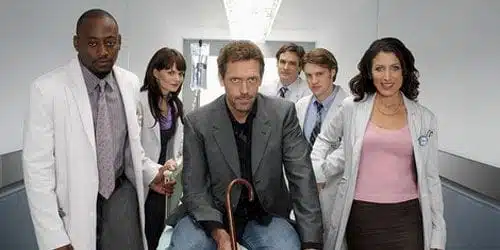
House has proven an unusually zeitgeisty phenomenon: in an era of milky American evangelism, it is unquestioningly anti-religious. Dr. Gregory House (Hugh Laurie), the world’s crankiest and most brilliant diagnostician, regularly treats zealots as idiots, aided by his casually nontheistic crew. The good doctor is unswerving in his determination to find scientific causality for all ailments, repeatedly resorting to ludicrously illegal lengths to solve medical mysteries.
For the large cross section of the American population who has never heard of Christopher Hitchens, Richard Dawkins, or PZ Myers, House is probably the most visible ambassador of the New Atheism, a rigorous, aggressively visible and increasingly dogmatic brand of anti-dogma. Still, his skepticism, so charming, persuasive, and comfortably arrogant, is now, entering Season Five, more than a bit exhausting.
Season Four, you’ll recall, saw creator David Shore bring in a new team of doctors to assist House, reducing the increasingly bland Cameron (Jennifer Morrison) and Chase (Jesse Spencer) to weekly cameos. In their place are three newbies and Omar Epps’ Dr. Foreman (my pet theory, as a House devotee, is that the show is as much about Foreman, House’s closest intellectual and personal rival, as it is about House himself). As in previous seasons, the team spends the season premiere’s first four acts making incredulous and medically baffling diagnoses until House swoops in at minute 41 to save the day with a syringe of tonic and a wiseacre homily. Only through Laurie’s dry line readings and the writing staff’s willful provocations have House’s cruel, impeccably timed bon mots not devolved into a parody-ready cliché of David Caruso’s order.
The first two episodes of the new season are pretty much like every other episode of the show, ever, and as mysteries, they’re fairly intriguing. The narrative arc continues from last season’s finale, in which, through unnecessarily complicated (but surprisingly moving) plot machinations, House accidentally caused the death of Amber (Anne Dudek), girlfriend of his best friend Wilson (Robert Sean Leonard). Wilson now seems determined to put the past behind him by leaving Princeton-Plainsboro Teaching Hospital, and House seems desperate to hold onto his only friend, hiring a private investigator to spy on Wilson for him.
The PI (Michael Weston) exemplifies the series’ tendency to mishandle recurring guest characters. Like David Morse’s Season Three villain, he is too eccentric to stand up next to House, whose bitchy wit requires a straight man. House’s new team members are better suited to this role. As Hadley (Olivia Wilde) deals with the implications on her career of her recent self-diagnosis of Huntington’s Chorea, she also, in the season premiere, focuses on a woman patient in need of attention. Kutner (Kal Penn) may be less straight, but he provides welcome comedy during a gleefully childish Mythbusters-like moment in the second episode, testing the tensile strength of a corpse’s colon using a high-powered jet of water.
Still, it’s Laurie’s show. As Shore has streamlined it (pushing that obnoxious Chase/Cameron romance to the background, minimizing the team’s private life details) to concentrate on House’s destructive personal relationships, it is primarily a forum for the actor to suss out the nuances of a character who, like the dogmatists he rejects and also represents, seems unwilling to acknowledge nuance.
When, in this season’s second episode, “Not Cancer,” a patient tells House he looks “miserable,” the shot cuts to a relatively placid-looking House, underscoring Laurie’s exquisite internalization of his character’s self-loathing and ego-despair. The actor’s embodiment of seemingly counterintuitive emotions is riveting, as House’s placidity demonstrates sorrow, while anger represents a kind of giddy id. Even if House isn’t offering new stories or themes, it remains a terrific showcase for a terrific performer.
